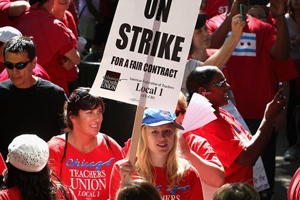Published January 28, 2018 in USA Today
Supreme Court May Deal Major Blow to Labor Unions
By Richard Wolf
WASHINGTON — The nation's powerful public employee unions stand to lose membership, money and political muscle at the hands of the Supreme Court this year. The only question appears to be how much.
On the court's docket next month are fees paid in 22 states by police, firefighters, teachers and other government workers who decline to join unions that must represent them anyway. But much more is at stake in a nation with declining union membership and growing economic inequality.
After three tries in 2012, 2014 and 2016, the high court is poised to reverse its own 40-year-old precedent and strike down the so-called "fair share" fees as unconstitutional. The 1977 ruling said workers did not have to pay for unions' political activity. The verdict expected by June would allow them to contribute nothing at all.
If the court's five conservatives vote the way both sides anticipate, public employee unions in traditionally Democratic states in the Northeast and West will lose those workers and the fees they pay. Other lawsuits could follow if workers are allowed to band together and seek refunds for fees already paid.
On top of that, unions are braced for a slow bleed of full dues-paying members. Until now, those workers could save only about 10% to 20% of their costs by quitting the union; a ruling against fair-share fees would enable them to become "free riders." That could force unions to raise dues on those who remain or lose clout in states such as California, New York, Illinois, Pennsylvania and New Jersey.
"If they don't see this coming, they're totally blind," says Daniel DiSalvo, a labor expert at the conservative Manhattan Institute. He predicts public employee unions could lose from 10% to 30% of their membership and financing over time.
The case, Janus v. American Federation of State, County, and Municipal Employees, will be heard Feb. 26 and decided by the end of June. It's backed by conservative groups that have tried for years to overturn the court's decades-old decision in Abood v. Detroit Board of Education, which upheld charging non-members fees to pay for collective bargaining, but not politics.
The court has ruled 7-2, 5-4 and 4-4 on three similar cases in the past six years, eating away at that 1977 decision without overruling it entirely. In 2016, Justice Antonin Scalia's death a month after oral argument denied conservatives their fifth vote — a vote Justice Neil Gorsuch is widely expected to provide.
Less assured is the impact such a ruling would have on organized labor in general, and public employees unions in particular. But after a 70-year decline in union membership, the consensus is for more of the same.
"If there is no union security in the public sector, we will see the diminution of union density, which is already miniscule in this country," says Angela Cornell, director of Cornell Law School's labor law clinic. "Unions cannot function without resources."
Declining membership
The nation's roughly 15 million union members make up less than 11% of the workforce, a drop from 35% during World War II. The decline has been fueled in the private sector, where only 6.5% of workers remain unionized.
But in the public sector, more than one in three workers belong to a union, a percentage that has held almost steady for decades. Unions such as AFSCME, the National Education Association, Service Employees International Union and American Federation of Teachers recognize that a loss at the Supreme Court will mean a loss of members.
Some 5 million workers could be affected by the ruling — those who pay dues or fair-share fees to unions in states where public employees can be forced to contribute. Workers in 28 other states cannot be forced to join or pay unions.
That divide between states is illustrated in union membership, which ranges from 7% of public employees in South Carolina to 67% in New York.
Some groups that have fought to end compulsory fees contend that unions can stave off membership declines by better representing workers. They cite data from states such as Indiana and Michigan following the enactment of right-to-work laws.
"Over time, the unions were able to appeal to workers, and the membership levels evened off and in some cases even increased," says Robert Alt, president of the Buckeye Institute, a free market think tank based in Ohio. "Unions can be competitive, even in a right-to-work scenario.”
'It hurts workers'
During the 2016 case, the 325,000-member California Teachers Association warned that tens of thousands of contracts governing millions of workers nationwide could be thrown into disarray if the Supreme Court upended fair-share fees. More than 4.5 million teachers are union members.
But the court's more conservative justices left little doubt where they stood. They sharply criticized mandatory fair-share fees in the public sector, where much of what unions do affects public policy and tax dollars.
That's the argument raised by the challengers in the Illinois case. "Bargaining with the government is political speech indistinguishable from lobbying the government," the National Right to Work Legal Defense Foundation says in court papers.
The Trump administration agrees — even though the Obama administration took the side of the unions in previous cases. Now the Justice Department argues that issues such as tenure, merit pay and the size of the workforce are public policy issues that workers should not have to finance.
"Virtually every matter at stake in a public-sector labor agreement affects the public fisc, and therefore is a matter of public policy concerning all citizens," the government's brief says.
But allowing workers to pay nothing for the work unions do on their behalf would lead to the "dismantling of unions," says Sylvia Allegretto, a labor economist at the University of California-Berkeley.
“It hurts workers," she says. "It hurts their wages. It hurts their benefits. It hurts their bargaining power.”